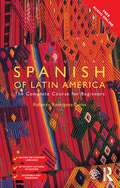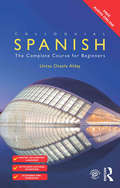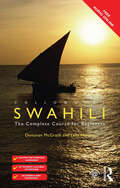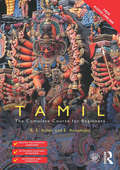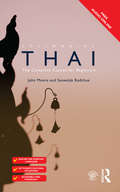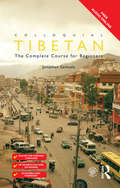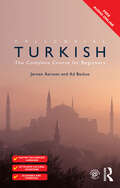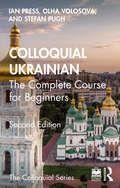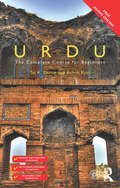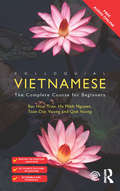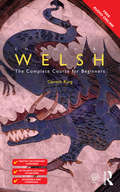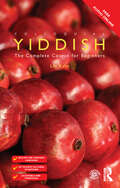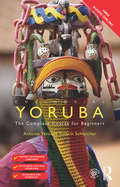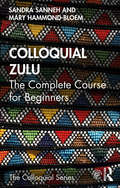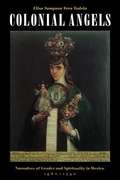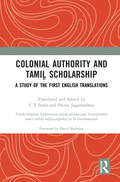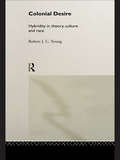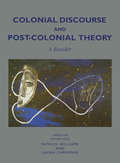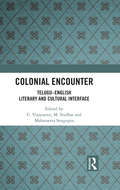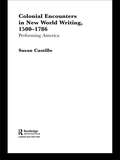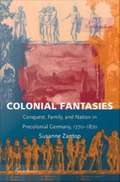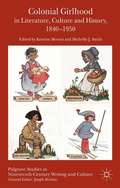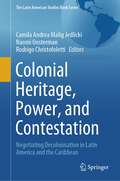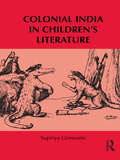- Table View
- List View
Colloquial Spanish of Latin America: The Complete Course for Beginners (Colloquial Series)
by Roberto Carlos Rodriguez-SaonaColloquial Spanish of Latin America: The Complete Course for Beginners has been carefully developed by an experienced teacher to provide a step-by-step course to Latin American Spanish as it is written and spoken today. Combining a clear, practical and accessible style with a methodical and thorough treatment of the language, it equips learners with the essential skills needed to communicate confidently and effectively in Latin American Spanish in a broad range of situations. No prior knowledge of the language is required.Colloquial Spanish of Latin America is exceptional; each unit presents a wealth of grammatical points that are reinforced with a wide range of exercises for regular practice. A full answer key, a grammar summary, bilingual glossaries and English translations of dialogues can be found at the back as well as useful vocabulary lists throughout.Key features include: A clear, user-friendly format designed to help learners progressively build up their speaking, listening, reading and writing skills Jargon-free, succinct and clearly structured explanations of grammar An extensive range of focused and dynamic supportive exercises Realistic and entertaining dialogues covering a broad variety of narrative situations Helpful cultural points explaining the customs and features of life in Latin America An overview of the sounds of Latin American Spanish Balanced, comprehensive and rewarding, Colloquial Spanish of Latin America is an indispensable resource both for independent learners and students taking courses in Latin American Spanish. Audio material to accompany the course is available to download free in MP3 format from www.routledge.com/cw/colloquials. Recorded by native speakers, the audio material features the dialogues and texts from the book and will help develop your listening and pronunciation skills.
Colloquial Spanish: The Complete Course for Beginners (The\colloquial Ser.)
by Untza Otaola AldayColloquial Spanish: The Complete Course for Beginners has been carefully developed by an experienced teacher to provide a step-by-step course to Spanish as it is written and spoken today. Combining a clear, practical and accessible style with a methodical and thorough treatment of the language, it equips learners with the essential skills needed to communicate confidently and effectively in Spanish in a broad range of situations. No prior knowledge of the language is required. Colloquial Spanish is exceptional; each unit presents a wealth of grammatical points that are reinforced with a wide range of exercises for regular practice. A full answer key, a grammar summary, bilingual glossaries and English translations of dialogues can be found at the back as well as useful vocabulary lists throughout. Key features include: A clear, user-friendly format designed to help learners progressively build up their speaking, listening, reading and writing skills Jargon-free, succinct and clearly structured explanations of grammar An extensive range of focused and dynamic supportive exercises Realistic and entertaining dialogues covering a broad variety of narrative situations Helpful cultural points explaining the customs and features of life in Spain An overview of the sounds of Spanish Balanced, comprehensive and rewarding, Colloquial Spanish is an indispensable resource both for independent learners and students taking courses in Spanish. Audio material to accompany the course is available to download free in MP3 format from www.routledge.com/cw/colloquials. Recorded by native speakers, the audio material features the dialogues and texts from the book and will help develop your listening and pronunciation skills.
Colloquial Swahili: The Complete Course for Beginners (Colloquial Ser.)
by Donovan McGrath Lutz MartenColloquial Swahili: The Complete Course for Beginners has been carefully developed by an experienced teacher to provide a step-by-step course to Swahili as it is written and spoken today. Combining a clear, practical and accessible style with a methodical and thorough treatment of the language, it equips learners with the essential skills needed to communicate confidently and effectively in Swahili in a broad range of situations. No prior knowledge of the language is required. Colloquial Swahili is exceptional; each unit presents a wealth of grammatical points that are reinforced with a wide range of exercises for regular practice. A full answer key, a grammar summary, bilingual glossaries and English translations of dialogues can be found at the back as well as useful vocabulary lists throughout. Key features include: A clear, user-friendly format designed to help learners progressively build up their speaking, listening, reading and writing skills Jargon-free, succinct and clearly structured explanations of grammar An extensive range of focused and dynamic supportive exercises Realistic and entertaining dialogues covering a broad variety of narrative situations Helpful cultural points explaining the customs and features of life in Swahili-speaking countries. An overview of the sounds of Swahili Balanced, comprehensive and rewarding, Colloquial Swahili is an indispensable resource both for independent learners and students taking courses in Swahili. Audio material to accompany the course is available to download free in MP3 format from www.routledge.com/cw/colloquials. Recorded by native speakers, the audio material features the dialogues and texts from the book and will help develop your listening and pronunciation skills.
Colloquial Tamil: The Complete Course for Beginners (The\colloquial Ser.)
by E. Annamalai R.E. AsherColloquial Tamil is easy to use and completely up to date! Specially written by experienced teachers for self-study or class use, the course offers a step-by-step approach to spoken Tamil. While emphasis is placed on colloquial spoken Tamil, you are given a useful introduction to formal speech and the written language as well. What makes Colloquial Tamil your best choice in personal language learning? Emphasis on authentic conversational language Clear explanations on how to pronounce and write the language Helpful grammar notes and reference grammar Comprehensive vocabulary lists (Tamil-English and English-Tamil) Lively illustrations and fascinating cultural insights throughout By the end of this rewarding course, you will be able to communicate confidently and effectively in Tamil in a broad range of everyday situations. Audio material to accompany the course is available to download free in MP3 format from www.routledge.com/cw/colloquials. Recorded by native speakers, the audio material features the dialogues and texts from the book and will help develop your listening and pronunciation skills.
Colloquial Thai: The Complete Course For Beginners (Colloquial Ser.)
by John Moore Saowalak RodchueColloquial Thai: The Complete Course for Beginners has been carefully developed by an experienced teacher to provide a step-by-step course to Thai as it is written and spoken today. Combining a clear, practical and accessible style with a methodical and thorough treatment of the language, it equips learners with the essential skills needed to communicate confidently and effectively in Thai in a broad range of situations. No prior knowledge of the language is required. Colloquial Thai is exceptional; each unit presents a wealth of grammatical points that are reinforced with a wide range of exercises for regular practice. A full answer key, a grammar summary, bilingual glossaries and English translations of dialogues can be found at the back as well as useful vocabulary lists throughout. Key features include: A clear, user-friendly format designed to help learners progressively build up their speaking, listening, reading and writing skills Jargon-free, succinct and clearly structured explanations of grammar An extensive range of focused and dynamic supportive exercises Realistic and entertaining dialogues covering a broad variety of narrative situations Helpful cultural points explaining the customs and features of life in Thailand. An overview of the sounds of Thai Balanced, comprehensive and rewarding, Colloquial Thai is an indispensable resource both for independent learners and students taking courses in Thai. Audio material to accompany the course is available to download free in MP3 format from www.routledge.com/cw/colloquials. Recorded by native speakers, the audio material features the dialogues and texts from the book and will help develop your listening and pronunciation skills.
Colloquial Tibetan: The Complete Course for Beginners (Colloquial Ser.)
by Jonathan SamuelsColloquial Tibetan provides a step-by-step course in Central Tibetan as it is spoken by native speakers. Combining a thorough treatment of the language as it is used in everyday situations with an accurate written representation of this spoken form, it equips learners with the essential skills needed to communicate confidently and effectively in Tibetan in a broad range of situations. No prior knowledge of the language is required. Key features include: progressive coverage of speaking, listening, reading and writing skills phonetic transliteration of the Tibetan script throughout the course to aid pronunciation and understanding of the writing system structured, jargon-free explanations of grammar an extensive range of focused and stimulating exercises realistic and entertaining dialogues covering a broad variety of scenarios useful vocabulary lists throughout the text additional resources available at the back of the book, including a full answer key, a grammar section, bilingual glossaries and English translations of dialogues. Balanced, comprehensive and rewarding, Colloquial Tibetan will be an indispensable resource both for independent learners and for students taking courses in Tibetan. Audio material to accompany the course is available to download free in MP3 format from www.routledge.com/cw/colloquials. Recorded by native speakers, the audio material features the dialogues and texts from the book and will help develop your listening and pronunciation skills. By the end of this course, you will be at Level B2 of the Common European Framework for Languages and at the Intermediate-High on the ACTFL proficiency scales.
Colloquial Turkish: The Complete Course for Beginners (Colloquial Ser.)
by Ad Backus Jeroen AarssenColloquial Turkish provides a step-by-step course in Turkish as it is written and spoken today. Combining a user-friendly approach with a thorough treatment of the language, it equips learners with the essential skills needed to communicate confidently and effectively in Turkish in a broad range of situations. No prior knowledge of the language is required. Key features include: • progressive coverage of speaking, listening, reading and writing skills • structured, jargon-free explanations of grammar • an extensive range of focused and stimulating exercises • realistic and entertaining dialogues covering a broad variety of scenarios • useful vocabulary lists throughout the text • additional resources available at the back of the book, including a full answer key, a grammar summary and bilingual glossaries Balanced, comprehensive and rewarding, Colloquial Turkish will be an indispensable resource both for independent learners and students taking courses in Turkish. Audio material to accompany the course is available to download free in MP3 format from www.routledge.com/cw/colloquials. Recorded by native speakers, the audio material features the dialogues and texts from the book and will help develop your listening and pronunciation skills.
Colloquial Ukrainian: The Complete Course for Beginners (Colloquial Series)
by Ian Press Stefan Pugh Olha VolosovaColloquial Ukrainian: The Complete Course for Beginners has been carefully developed by experienced teachers to provide a step-by-step course to learn the Ukrainian language as it is written and spoken today. This second edition offers updated vocabulary, additional exercises, cultural notes, and brand new audio.Combining a clear, practical and accessible style with a methodical and thorough treatment of the language, it equips learners with the essential skills needed to communicate confidently and effectively in Ukrainian in a broad range of situations. No prior knowledge of the language is required. Colloquial Ukrainian is exceptional; each unit presents a wealth of grammatical points that are reinforced with a wide range of exercises for regular practice.Key features include: A clear, user-friendly format designed to help learners progressively build up their speaking, listening, reading, and writing skills Jargon-free, succinct, and clearly structured explanations of grammar An extensive range of focused and dynamic supportive exercises Realistic and entertaining dialogues covering a broad variety of narrative situations Balanced, comprehensive, and rewarding, Colloquial Ukrainian is an indispensable resource both for independent learners and students taking courses in Ukrainian.Audio material to accompany the course is available to download free in MP3 format from www.routledge.com/cw/colloquials. Recorded by native speakers, the audio material features the dialogues and texts from the book and will help develop your listening and pronunciation skills.
Colloquial Urdu: The Complete Course for Beginners (Colloquials Ser.)
by Tej K Bhatia Ashok Khoul Ashok KoulColloquial Urdu provides a step-by-step course in Urdu as it is written and spoken today. Combining a user-friendly approach with a thorough treatment of the language, it equips learners with the essential skills needed to communicate confidently and effectively in Urdu in a broad range of situations. No prior knowledge of the language is required. Key features include: progressive coverage of speaking, listening, reading and writing skills structured, jargon-free explanations of grammar an extensive range of focused and stimulating exercises realistic and entertaining dialogues covering a broad variety of scenarios useful vocabulary lists throughout the text additional resources available at the back of the book, including a full answer key, a grammar summary, bilingual glossaries and English translations of dialogues. This second edition has been extensively updated and revised throughout, with particular attention to the Urdu script – coverage is now integrated throughout the book and the script font has been enlarged and improved. Balanced, comprehensive and rewarding, Colloquial Urdu will be an indispensable resource both for independent learners and for students taking courses in Urdu. By the end of this course, you will be at Level B2 of the Common European Framework for Languages and at the Intermediate-High on the ACTFL proficiency scales. Audio material to accompany the course is available to download free in MP3 format from www.routledge.com/cw/colloquials. Recorded by native speakers, the audio material features the dialogues and texts from the book and will help develop your listening and pronunciation skills.
Colloquial Vietnamese: The Complete Course for Beginners
by Bac Hoai Tran Ha Minh Nguyen Tuan Duc Vuong Que VuongColloquial Vietnamese: The Complete Course for Beginners has been carefully developed by an experienced teacher to provide a step-by-step course to Vietnamese as it is written and spoken today. Combining a clear, practical and accessible style with a methodical and thorough treatment of the language, it equips learners with the essential skills needed to communicate confidently and effectively in Vietnamese in a broad range of situations. No prior knowledge of the language is required. Colloquial Vietnamese is exceptional; each unit presents a wealth of grammatical points that are reinforced with a wide range of exercises for regular practice. A full answer key, a grammar summary, bilingual glossaries and English translations of dialogues can be found at the back as well as useful vocabulary lists throughout. Key features include: A clear, user-friendly format designed to help learners progressively build up their speaking, listening, reading and writing skills Jargon-free, succinct and clearly structured explanations of grammar An extensive range of focused and dynamic supportive exercises Realistic and entertaining dialogues covering a broad variety of narrative situations Helpful cultural points explaining the customs and features of life in Vietnam. An overview of the sounds of Vietnamese Balanced, comprehensive and rewarding, Colloquial Vietnamese is an indispensable resource both for independent learners and students taking courses in Vietnamese. Audio material to accompany the course is available to download free in MP3 format from www.routledge.com/cw/colloquials. Recorded by native speakers, the audio material features the dialogues and texts from the book and will help develop your listening and pronunciation skills.
Colloquial Welsh: The Complete Course for Beginners (Colloquial Ser.)
by Gareth KingColloquial Welsh provides a step-by-step course in Welsh as it is written and spoken today. Combining a user-friendly approach with a thorough treatment of the language, it equips learners with the essential skills needed to communicate confidently and effectively in Welsh in a broad range of situations. No prior knowledge of the language is required. Key features include: • progressive coverage of speaking, listening, reading and writing skills • structured, jargon-free explanations of grammar • an extensive range of focused and stimulating exercises • realistic and entertaining dialogues covering a broad variety of scenarios • useful vocabulary lists throughout the text • additional resources available at the back of the book, including a full answer key, a grammar summary and bilingual glossaries Balanced, comprehensive and rewarding, Colloquial Welsh will be an indispensable resource both for independent learners and students taking courses in Welsh. Audio material to accompany the course is available to download free in MP3 format from www.routledge.com/cw/colloquials. Recorded by native speakers, the audio material features the dialogues and texts from the book and will help develop your listening and pronunciation skills.
Colloquial Yiddish
by Lily KahnSpecially written by an experienced teacher, Colloquial Yiddish offers a step-by-step approach to Yiddish as it is spoken and written today. Colloquial Yiddish provides the first widely available, easily accessible, comprehensive Yiddish course designed primarily for the twenty-first-century international English-speaking independent learner and suitable for use in Yiddish classes worldwide. Each unit presents numerous grammatical points that are reinforced with a wide range of exercises for regular practice. A full answer key can be found at the back as well as useful vocabulary summaries throughout. Key features include: graded development of speaking, listening, reading and writing skills realistic and entertaining dialogues jargon-free and clearly structured grammatical explanations a range of dynamic and appropriate supporting exercises supplementary texts presenting many of the most significant and relevant aspects of Yiddish culture. By the end of this rewarding course you will be able to communicate confidently and effectively in Yiddish in a broad range of situations. Course components: The complete course comprises the book and audio materials. These are available to purchase separately in paperback, ebook, CD and MP3 format. The paperback and CDs can also be purchased together in the great-value Colloquials pack. Paperback: 978-0-415-58019-9 (please note this does not include the audio) CDs: 978-0-415-58020-5 eBook: 978-0-203-85120-3 (please note this does not include the audio, available to purchase from http://ebookstore.tandf.co.uk/audio_viewbooks.aspx) MP3s: 978-0-415-58021-2 (available to purchase from http://ebookstore.tandf.co.uk/audio_viewbooks.aspx) Pack: 978-0-415-58022-9 (paperback and CDs)
Colloquial Yiddish (Colloquial Series)
by Lily KahnSpecially written by an experienced teacher, Colloquial Yiddish offers a step-by-step approach to Yiddish as it is spoken and written today.Colloquial Yiddish provides the first widely available, easily accessible, comprehensive Yiddish course designed primarily for the twenty-first-century international English-speaking independent learner and suitable for use in Yiddish classes worldwide.Each unit presents numerous grammatical points that are reinforced with a wide range of exercises for regular practice. A full answer key can be found at the back as well as useful vocabulary summaries throughout.Key features include: graded development of speaking, listening, reading and writing skills realistic and entertaining dialogues jargon-free and clearly structured grammatical explanations a range of dynamic and appropriate supporting exercises supplementary texts presenting many of the most significant and relevant aspects of Yiddish culture. By the end of this rewarding course you will be able to communicate confidently and effectively in Yiddish in a broad range of situations.Course components:The complete course comprises the book and audio materials. These are available to purchase separately in paperback, ebook, CD and MP3 format. The paperback and CDs can also be purchased together in the great-value Colloquials pack. Paperback: 978-0-415-58019-9 (please note this does not include the audio)CDs: 978-0-415-58020-5eBook: 978-0-203-85120-3 (please note this does not include the audio, available to purchase from http://ebookstore.tandf.co.uk/audio_viewbooks.aspx)MP3s: 978-0-415-58021-2 (available to purchase from http://ebookstore.tandf.co.uk/audio_viewbooks.aspx)Pack: 978-0-415-58022-9 (paperback and CDs)
Colloquial Yoruba: The Complete Course for Beginners (Colloquial Ser.)
by Antonia Yetunde SchleicherColloquial Yoruba: The Complete Course for Beginners has been carefully developed by an experienced teacher to provide a step-by-step course to Yoruba as it is written and spoken today. Combining a clear, practical and accessible style with a methodical and thorough treatment of the language, it equips learners with the essential skills needed to communicate confidently and effectively in Yoruba in a broad range of situations. No prior knowledge of the language is required. Colloquial Yoruba is exceptional; each unit presents a wealth of grammatical points that are reinforced with a wide range of exercises for regular practice. A full answer key, a grammar summary, bilingual glossaries and English translations of dialogues can be found at the back as well as useful vocabulary lists throughout. Key features include: A clear, user-friendly format designed to help learners progressively build up their speaking, listening, reading and writing skills Jargon-free, succinct and clearly structured explanations of grammar An extensive range of focused and dynamic supportive exercises Realistic and entertaining dialogues covering a broad variety of narrative situations Helpful cultural points explaining the customs and features of life in Nigeria An overview of the sounds of Yoruba Balanced, comprehensive and rewarding, Colloquial Yoruba is an indispensable resource both for independent learners and students taking courses in Yoruba. Audio material to accompany the course is available to download free in MP3 format from www.routledge.com/cw/colloquials. Recorded by native speakers, the audio material features the dialogues and texts from the book and will help develop your listening and pronunciation skills.
Colloquial Zulu: The Complete Course for Beginners (Colloquial Series)
by Sandra Sanneh Mary Hammond-BloemColloquial Zulu is an easy-to-use and up-to-date guide to the Zulu language. Specially written for self-study or class use, the course offers you a step-by-step approach to written and spoken Zulu. No prior knowledge of the language is required. What makes Colloquial Zulu your best choice in language learning? It’s interactive – it has lots of exercises for regular practice. It’s clear – it has concise grammar notes. It’s practical – it has useful vocabulary and a pronunciation guide . It’s complete – it includes an answer key and reference section. Whether you’re a business traveller or you work for an NGO, whether you’re studying to teach or are looking forward to a holiday – if you’d like to get up and running with Zulu, this rewarding course will take you from complete beginner to confidently putting your language skills to use in a wide range of everyday situations. This course is also ideal for an institution-based setting with its clear language pedagogy, cultural information and notes. Accompanying audio material, recorded by native speakers, is available free online at www.routledge.com/cw/colloquials. The audio material will help develop your listening and pronunciation skills.
Colonial Angels: Narratives of Gender and Spirituality in Mexico, 1580-1750
by Sampson Vera Tudela ElisaThe author argues that the New World context necessitated the creation of a new kind of writing. Drawing on previously unpublished writings by and about nuns in the convents of Mexico City, she investigates such topics as the relationship between hagiography and travel narratives, male visions of the feminine that emerge from the reworking of a nun's letters to her confessor into a hagiography, the discourse surrounding a convent's trial for heresy by the Inquisition, and the reports of Spanish priests who ministered to noble Indian women. This research rounds out colonial Mexican history by revealing how tensions between Spain and its colonies played out in the local, daily lives of women.
Colonial Authority and Tamiḻ Scholarship: A Study of the First English Translations
by C T Indra and Prema JagannathanThis book—an English translation of a key Tamiḻ book of literary and cultural criticism—looks at the construction of Tamiḻ scholarship through the colonial approach to Tamiḻ literature as evidenced in the first translations into English. The Tamiḻ original Atikāramum tamiḻp pulamaiyum: Tamiḻiliruntu mutal āṅkila moḻipeyarppukaḷ by N Govindarajan is a critique of the early attempts at the translations of Tamiḻ literary texts by East India Company officials, specifically by N E Kindersley. Kindersley, who was working as the Collector of South Arcot district in the late eighteenth century, was the first colonial officer to translate the Tamiḻ classic Tirukkuṟaḷ and the story of King Naḷa into English and to bring to the reading public in English the vibrant oral narrative tradition in Tamiḻ. F W Ellis in the nineteenth century brought in another dimension through his translation of the same classic. The book, thus, focuses on the attempts to translate the Tamiḻ literary works by the Company’s officials who emerged as the pioneering English Dravidianists and the impact of translations on the Tamiḻ reading community. Theoretically grounded, the book makes use of contemporary perspectives to examine colonial interventions and the operation of power relations in the literary and socio-cultural spheres. It combines both critical readings of past translations and intensive research work on Tamiḻ scholarship to locate the practice of literary works in South Asia and its colonial history, which then enables a conversation between Indian literary cultures. In this book, the author has not only explored all key scholarly sources as well as the commentaries that were used by the colonial officials, chiefly Kindersley, but also gives us an insightful critique of the Tamiḻ works. The highlight of the discussion of Dravidian Orientalism in this book is the intralinguistic opposition of the “mainstream” Tamiḻ literature in “correct/poetical” Tamiḻ and the folk literature in “vacana” Tamiḻ. This framework allows the translators to critically engage with the work. Annotated and with an Introduction and a Glossary, this translated work is a valuable addition to our reading of colonial South India. The book will be of interest to researchers of Tamiḻ Studies, Orientalism and Indology, translation studies, oral literature, linguistics, South Asian Studies, Dravidian Studies and colonial history.
Colonial Desire: Hybridity in Theory, Culture and Race
by Robert J. YoungThe language of contemporary cultural theory shows remarkable similarities with the patterns of thought which characterised Victorian racial theory. Far from being marked by a separation from the racialised thinking of the past, Colonial Desire shows we are operating in complicity with historical ways of viewing 'the other', both sexually and racially.Colonial Desire is a controversial and bracing study of the history of Englishness and 'culture'. Robert Young argues that the theories advanced today about post-colonialism and ethnicity are disturbingly close to the colonial discourse of the nineteenth century. 'Englishness', Young argues, has been less fixed and stable than uncertain, fissured with difference and a desire for otherness.
Colonial Discourse and Post-Colonial Theory: A Reader
by Patrick Williams Laura ChrismanThis popular text provides an in-depth introduction to debates within post-colonial theory and criticism. The readings are drawn from a diverse selection of thinkers both historical and contemporary.
Colonial Encounter: Telugu–English Literary and Cultural Interface
by C. Vijayasree M. Sridhar Mahasweta SenguptaThis book focuses on transactions between English and Telugu through a study of translations and related works published from about the early-nineteenth century to mid-twentieth century. Moving beyond Edward Said’s theoretical paradigms which suggest that these interfaces were driven by imperial and colonial interests, the essays in this volume look at how they also triggered developments within the indigenous literary and cultural practices and evolved new forms of expression. The book will be of great interest to scholars and researchers of linguistics, translation studies, comparative literature, cultural studies and modern South Asian history.
Colonial Encounters in New World Writing, 1500-1786: Performing America
by Susan CastilloSusan Castillo’s pioneering study examines the extraordinary proliferation of polyphonic or ‘multi-voiced’ texts in the three centuries following the first contact between Europeans and the indigenous peoples of the Americas. Taking a selection of plays, printed dialogues, travel narratives and lexicographic studies in English, Spanish and French, the book explores both European and indigenous writers of the early Americas. Paying particular attention to performance and performativity in the texts of the early colonial world, Susan Castillo asks: why vast numbers of polyphonic and performative texts emerged in the Early Americas how these texts enabled explorers, settlers and indigenous groups to come to terms with radical differences in language, behaviour and cultural practices how dialogues, plays and paratheatrical texts were used to impose or resist ideologies and cultural norms how performance and polyphony allowed Europeans and Americans to debate exactly what it meant to be European or American, or in some cases, both. Tracing the dynamic enactment of (often conflictive) encounters between differing local narratives, Castillo presents polyphonic texts as not only singularly useful tools for exploring what initially seemed inexpressible or for conveying controversial ideas, but also as the site where cultural difference is negotiated. Offering unparalleled linguistic and historical range, through the analysis of texts from Spain, France, New Spain, Peru, Brazil, New England and New France, this volume is an important advance in the study of early American literature and the writings of colonial encounter.
Colonial Fantasies: Conquest, Family, and Nation in Precolonial Germany, 1770-1870
by Susanne ZantopSince Germany became a colonial power relatively late, postcolonial theorists and histories of colonialism have thus far paid little attention to it. Uncovering Germany's colonial legacy and imagination, Susanne Zantop reveals the significance of colonial fantasies--a kind of colonialism without colonies--in the formation of German national identity. Through readings of historical, anthropological, literary, and popular texts, Zantop explores imaginary colonial encounters of "Germans" with "natives" in late-eighteenth- and early-nineteenth-century literature, and shows how these colonial fantasies acted as a rehearsal for actual colonial ventures in Africa, South America, and the Pacific. From as early as the sixteenth century, Germans preoccupied themselves with an imaginary drive for colonial conquest and possession that eventually grew into a collective obsession. Zantop illustrates the gendered character of Germany's colonial imagination through critical readings of popular novels, plays, and travel literature that imagine sexual conquest and surrender in colonial territory--or love and blissful domestic relations between colonizer and colonized. She looks at scientific articles, philosophical essays, and political pamphlets that helped create a racist colonial discourse and demonstrates that from its earliest manifestations, the German colonial imagination contained ideas about a specifically German national identity, different from, if not superior to, most others.
Colonial Girlhood in Literature, Culture and History, 1840-1950
by Kristine Moruzi Michelle J. SmithColonial Girlhood in Literature, Culture and History, 1840-1950 explores a range of real and fictional colonial girlhood experiences from Jamaica, Mauritius, South Africa, India, New Zealand, Australia, England, Ireland, and Canada to reflect on the transitional state of girlhood between childhood and adulthood.
Colonial Heritage, Power, and Contestation: Negotiating Decolonisation in Latin America and the Caribbean (The Latin American Studies Book Series)
by Rodrigo Christofoletti Naomi Oosterman Camila Andrea Malig JedlickiRecent debates about the return of colonially looted heritage have furthered the discussions on decolonisation around the world, and have reignited questions surrounding “what is, and who owns, cultural heritage”. These discourses in the meaning, production and management of heritage – with a growing presence of themes that address “Latinities” – have gained greater visibility in Latin America and the Caribbean, as challenges surrounding cultural heritage arise more prominently worldwide. The attention on this region aims to contextualise the various theoretical, empirical, and critical perspectives in relation to the negotiation of decolonisation. Hence, this book focuses on the analysis of diverse modes of confronting the power underlying colonial heritage that can contribute to pushing boundaries and persuading changes in pre-established definitions of political thought and local identities. To this end, the chapters in this book focus on a wide scope of topics, ranging from the repatriation and restitution of cultural heritage, and diasporic movements to decolonial practices around monuments, museums, and education. In so doing, this volume challenges stereotypes that made Latin America and the Caribbean a space of mere reproducibility of external ideas, and instead provides a space to show current decolonial perspectives and practices developed in the region that will enrich the international debate on the contestation of colonial legacies and decolonisation of cultural heritage.
Colonial India in Children's Literature (Children's Literature and Culture #85)
by Supriya GoswamiColonial India in Children’s Literature is the first book-length study to explore the intersections of children’s literature and defining historical moments in colonial India. Engaging with important theoretical and critical literature that deals with colonialism, hegemony, and marginalization in children's literature, Goswami proposes that British, Anglo-Indian, and Bengali children’s literature respond to five key historical events: the missionary debates preceding the Charter Act of 1813, the defeat of Tipu Sultan, the Mutiny of 1857, the birth of Indian nationalism, and the Swadeshi movement resulting from the Partition of Bengal in 1905. Through a study of works by Mary Sherwood (1775-1851), Barbara Hofland (1770-1844), Sara Jeanette Duncan (1861-1922), Rudyard Kipling (1865-1936), Upendrakishore Ray (1863-1915), and Sukumar Ray (1887-1923), Goswami examines how children’s literature negotiates and represents these momentous historical forces that unsettled Britain’s imperial ambitions in India. Goswami argues that nineteenth-century British and Anglo-Indian children’s texts reflect two distinct moods in Britain’s colonial enterprise in India. Sherwood and Hofland (writing before 1857) use the tropes of conversion and captivity as a means of awakening children to the dangers of India, whereas Duncan and Kipling shift the emphasis to martial prowess, adaptability, and empirical knowledge as defining qualities in British and Anglo-Indian children. Furthermore, Goswami’s analysis of early nineteenth-century children’s texts written by women authors redresses the preoccupation with male authors and boys’ adventure stories that have largely informed discussions of juvenility in the context of colonial India. This groundbreaking book also seeks to open up the canon by examining early twentieth-century Bengali children’s texts that not only draw literary inspiration from nineteenth-century British children’s literature, but whose themes are equally shaped by empire.
